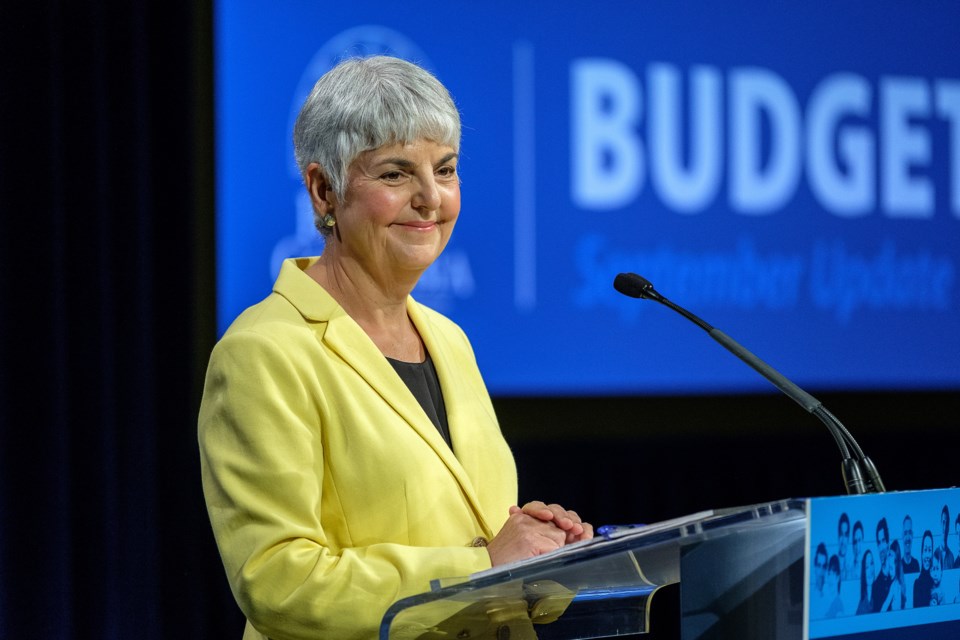B.C.’s Finance Minister Carole James presented an updated provincial budget on Monday that provided few additional details on how the government plans to improve life in Richmond.
For instance, exactly when 25 schools will receive seismic upgrades and when Richmond Hospital will finally get a new acute care tower remains to be seen. And few details — in James’ speech and the NDP government’s Throne Speech on Friday — have been provided on how the government intends to tackle Metro Vancouver’s highly speculative real estate market.
The budget update outlines broad new spending goals and new taxation measures. James said the party’s election platform will come more into light during the annual budget in February.
As for this week’s update, the big spend comes in the form of a 50 per cent cut to MSP premiums starting Jan. 1. This will cost $1.25 billion.
Health spending is going to be increased by $603 million over three years but no new money was earmarked for Richmond Hospital’s decrepit acute care tower replacement. A new tower is in the business case development stage and local NDP candidates, as well as Premier John Horgan, vowed before the election to expedite the process and have funding ready immediately.
Vancouver Coastal Health said it should finish the business case by year end, leaving the NDP to approve it. Notably, the budget update adds New Westminster’s Royal Columbian Hospital (Phases 2 and 3) to the capital spending plan at a cost of $1.1 billion, after the BC Liberals approved the business case in April.
There are no details on when Richmond schools will be seismically upgraded. The seismic mitigation program has a $1.3 billion budget to 2030 — a vestige of the BC Liberals.
The update did announce $681 million in new funding for classroom supports over the next three years.
Richmond School District is facing yet another multi-million dollar deficit this year ($6.5 million) as schools are seeing declining enrollment believed to be fostered by high housing costs for families.
On the housing front, the NDP has only hinted at action against speculation and foreign money influencing land values by stating in the Throne Speech that it will be “examining options to curb speculation.”
Activist group Housing Action for Local Taxpayers (HALT) decried the lack of initiative on the housing market.
“While other ministries have made quick progress fulfilling some of the campaign promises like ending tolls, increasing welfare rates, action on stopping Kinder Morgan, reassessing viability for Site C and ending the Grizzly hunt, there has been no action taken or information shared by the Ministry of Housing, the Ministry of Finance, and the Attorney General on housing, apart from ‘we are still reviewing the file,’” stated HALT, which calls on the province to work with Canada Revenue Agency to close capital gains and income tax loopholes.
The update instead focuses on the lowest income earners and vulnerable citizens by announcing an additional $208 million for 1,700 new affordable rental units across the province.
Those funds are no doubt assisted in part by real estate transactions in Richmond. Overall, the government expects $333 million in additional property transfer taxes this year. The 15 per cent foreign buyers’ tax is expected to pull in $200 million from Metro Vancouver. But there are no apparent plans to extend the tax onto farmland, as requested by BC Green Party leader Andrew Weaver last week.
Social spending is up with the NDP, affecting many Richmondites.
There will be a $100 per month increase to both income assistance and disability assistance, with James declaring it the “first meaningful rate increase in 10 years.”
This responds to concerns from the disabled community, including that of Richmond Centre for Disability, whose members protested MLA Teresa Wat’s office last September.
Meanwhile, as Richmond’s population of people who cannot speak English nor French rises year over year, the NDP took measures to restore tuition-free Adult Basic Education and English Language Learning programs ($19 million).
Government is adding $322 million to fight the fentanyl/opioid overdose crisis province-wide. More people have died of illicit drug overdoses in Richmond during the first half of this year than all of last year, according to the B.C. Coroners Service.
The government will be increasing the individual income tax rate to 16.8 per cent, up from 14.7 per cent, on taxable income over $150,000 ($273 million annually). It will also increase the corporate income tax rate to 12 per cent, from 11 per cent ($306 million annually). Small business tax rates will go down to two per cent from 2.5 per cent, costing $81 million.
And the Carbon Tax Act will be repealed meaning it will no longer be revenue neutral. James told media the government will spend the money on low-emission projects and infrastructure. The carbon tax will also rise $5 per tonne of CO2 in 2018. Low-income families will receive additional carbon tax credits but a family earning $50,000 will pay an extra $50 per year.
As for local infrastructure, the procurement of the George Massey Replacement Project (10-lane bridge) was cancelled and “the project has been removed from the major projects table.”
Improvements to the Alex Fraser Bridge are still on the books. The federal and provincial government will spend $70 million to add a seventh lane by using a new counter-flow movable barrier.



